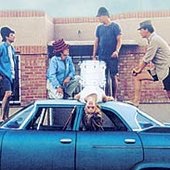
The Shadows of Knight were an American rock band from Chicago, Illinois, that played a version of British blues influenced by their native city. When they began recording in 1965, the band's self-description was "the Stones, Animals and the Yardbirds took the Chicago blues and gave it an English interpretation. We've taken the English version of the Blues and re-added a Chicago touch," to which rock critic Richie Unterberger commented: "The Shadows of Knight's self-description was fairly accurate."

The Music Machine was an American rock band formed in Los Angeles, California in 1966. Fronted by chief songwriter and lead vocalist Sean Bonniwell, the band cultivated a characteristically dark and rebellious image reflected in an untamed musical approach. Sometimes it made use of distorted guitar lines and hallucinogenic organ parts, punctuated by Bonniwell's distinctively throaty vocals. Although they managed to attain national chart success only briefly with two singles, the Music Machine is today considered by many critics to be one of the groundbreaking acts of the 1960s. Their style is now recognized as a pioneering force in proto-punk; yet within a relatively short period of time, they began to employ more complex lyrical and instrumental arrangements that went beyond the typical garage band format.
The Lollipop Shoppe was an American garage rock band formed in Las Vegas, Nevada, in 1966.
The Choir was a garage rock band largely active in the greater Cleveland area from the mid-1960s into the early 1970s. Originally called The Mods, their largest commercial success came with the release of their first single "It's Cold Outside" in December 1966. The song, considered to be a classic of the garage rock era, was featured on Pebbles, Volume 2, one of the earlier garage rock compilation LPs. The flipside, "I'm Going Home" was included as a bonus track when the Pebbles album was reissued as a CD, and it can also be found on a garage rock compilation LP on Ohio bands, Highs in the Mid-Sixties, Volume 9. The Choir is well known for containing three of the four original members of Raspberries.

Pebbles, Volume 3, subtitled The Acid Gallery, is a compilation album featuring American underground psychedelic rock musical artists from the 1960s. It is the third installment of the Pebbles series and was released on BFD Records in 1979. The album is marked for containing among the most unusual recordings of psychedelic music.
The Third Bardo was an American psychedelic and garage rock band from New York City, New York. Their name is a reference to the book The Tibetan Book of the Dead.

The Pebbles Box is a 5-LP box set of mid-1960s garage rock and psychedelic rock recordings, primarily by American bands. Several years later, a similar 5-CD box set was released that was called the Trash Box. The Pebbles Box purports to collect the first five volumes of the Pebbles series, although there are fewer songs than on the original LPs: 72 total tracks on the five discs, as compared with 86 on the original LPs. Also, as is generally true of the CD reissues of these five volumes, the tracks differ significantly on all five discs as compared to both the original Pebbles LPs and the later Pebbles CDs in the corresponding volumes; and the surf rock rarities on Pebbles, Volume 4 have been eschewed entirely.
Not to be confused with Styx (band)
The Bruthers were an American garage rock band from Pearl River, New York, active in the mid to late 1960s, and whose membership consisted the four brothers, Alf, Frank, Mike, and Joe of the Delia family. They recorded several songs for RCA records, of which, "Bad Way to Go" is the best known. The song is included on the compilation album, Pebbles Vol. 8, and is regarded by enthusiasts and collectors as a classic in the genre.
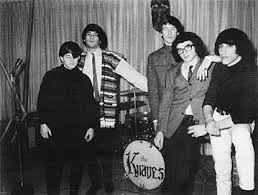
The Knaves were an American garage rock band formed in Chicago, Illinois, in 1964. The band released two singles during their existence, including the song "Leave Me Alone", which is now considered a classic of the musical genre of garage rock. In addition, the group's sound was particularly unique for combining elements of folk rock and proto-punk, making the Knaves stand out among their contemporaries.
The Magicians were an American garage rock band formed in New York City, New York, in 1965. The group released four singles during their brief recording career with Columbia Records, with their most well-known song being "An Invitation to Cry". Members Alan Gordon and Garry Bonner later became a successful songwriting duo, and the Magicians' material was assembled on a compilation album in 1999.
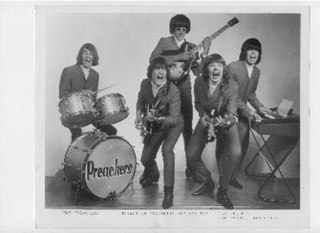
The Preachers were an American garage rock band formed in Los Angeles, California, in 1964. Musically, the group took an intense, and pounding musical approach that was heavily influenced by the British Invasion groups, particularly the Rolling Stones and the Dave Clark Five, and their take on American R&B. In their brief recording career, the Preachers released three singles, with their most acclaimed recording being a high-energy rendition of Bo Diddley's, "Who Do You Love?".

Surfbeat Behind the Iron Curtain, Volume 1 is a compilation album featuring underground garage and surf rock musical artists east of the Iron Curtain that were recorded between 1963 and 1966. It is the first installment of the Planetary Pebbles series, which was a sub-series to the Pebbles series, and was released on AIP Records, on August 12, 1997.

Garage Beat '66! is a series of garage rock compilation albums issued by Sundazed Records. The series currently consists of seven CDs, each of which is officially designated by its volume number, which appears in the upper left-hand corner of the front cover, and a corresponding "catch phrase" title, which appears as a subheading under the large Garage Beat '66 logo below. The Garage Beat '66 series attempts to represent the breadth and variety of the genre, including not only rawer hard-rocking numbers, but also songs displaying folk rock and psychedelic influence, as well as pop. All of the currently existing installments were released between 2004 and 2007. The series is recognized for good sound quality: all of the song selections were mastered from the original studio source elements. All of the volumes follow the packaging format employed by other garage compilation series such as Pebbles. Each volume includes detailed and fully researched liner notes, which include biographical sketches about each song and group, as well as other information such as origin and recording date, as well as photographs of the bands.
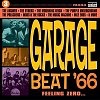
Garage Beat '66 Volume 3: Feeling Zero... is a compilation album featuring rare material recorded by American psychedelic and garage rock bands that were active in the 1960s. The album's contents are sourced from the original master tapes. It is the third installment of the Garage Beat '66 series and was released on April 27, 2004, on Sundazed Records.

"Action Woman" is a song by the American garage rock band the Litter, written by their record producer Warren Kendrick, and first released as the group's debut single on Scotty Records in January 1967. The song also appeared on the band's first album Distortions. Although "Action Woman" never broke out on the national charts, it is now revered as a classic piece of the musical genre of garage rock. Accordingly, the composition has appeared on several compilation albums – most famously as the opening track on Pebbles, Volume 1, incorporating a skip in the recording – and has been the subject of cover versions.

"It's Cold Outside" is a song by the American garage rock band the Choir, written by member Dann Klawon, and first released on Canadian-American Records in September 1966. It was later re-released in 1967 on Roulette, with Dann's last name incorrectly spelled "Klawson". The song is considered a classic of the musical genre of garage rock, and became the group's only national hit. The song has since been featured on several compilation albums. At the time of the recording, the band consisted of: Wally Bryson - lead guitar, Dave Smalley - guitar/vocals, Dave Burke - bass, Jim Bonfanti - drums, and Dann Klawon - multiple instruments/vocals. The group changed members over the years, but Bryson, Smalley and Bonfanti would team up with songwriter Eric Carmen a few years later, and form the power pop group Raspberries.
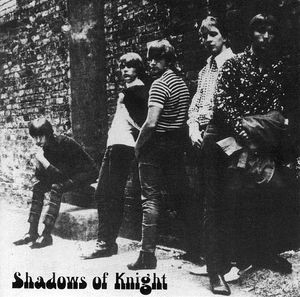
Raw 'n' Alive at the Cellar, Chicago 1966! is a live album by the American garage rock band the Shadows of Knight, and was released on Sundazed Records in 1992. The album consists of recordings from the band's appearance at the Cellar in Arlington Heights, Illinois in December 1966. Although the tapes were never anticipated to be released publicly, Raw 'n' Alive at the Cellar is commended for its good sound quality, and represents one of the better live concert recordings to emerge from the garage rock era.
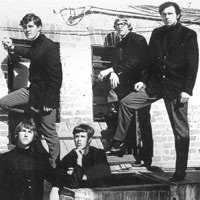
The E-Types were an American garage rock band formed in Salinas, California, in 1965. The group's sound combined striking three-part vocal harmonies and Jody Wence's jangling keyboards, with professional production techniques that were outside of the garage band norm. During the E-Types' recording career, the band released five singles, including their most notable record "Put the Clock Back on the Wall". Although the band was short-lived, the E-Types had a profound presence in San Francisco's live scene and, years after their disbandment, the group recorded a reunion album.

Distortions is the debut studio album by American psychedelic and garage rock band the Litter. It was released on May 1, 1967, by Warick Records and includes the single "Action Woman".
